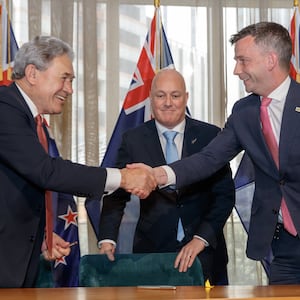Politics
New Zealand Leaders Distance From PM’s Remarks on Netanyahu

New Zealand political leaders David Seymour and Winston Peters have publicly distanced themselves from Prime Minister Christopher Luxon’s critical remarks regarding Israeli Prime Minister Benjamin Netanyahu. During a press engagement, Luxon stated that Netanyahu had “lost the plot,” a comment that has drawn significant attention and backlash.
Seymour, who serves as Deputy Prime Minister and leads the Act Party, emphasized the importance of discretion when discussing international leaders. He advised that it is often “better just to keep your thoughts to yourself” in such contexts. Meanwhile, Peters, the Minister of Foreign Affairs and leader of New Zealand First, expressed that the language used by Luxon is not reflective of his own approach. Both politicians refrained from commenting immediately after Luxon’s remarks, indicating they wanted to verify the context of the statements made.
Israeli Deputy Foreign Affairs Minister Sharren Haskel responded sharply to Luxon’s comments, suggesting that the Prime Minister lacks an understanding of the complexities faced by Israel, particularly in dealing with Hamas. Haskel remarked that New Zealand’s “most deadly enemy is a possum or a cat,” highlighting what she perceives as a disconnect between New Zealand’s challenges and those faced by Israel.
Luxon’s comments came following a question from the Herald regarding whether he agreed with Labour Party leader Chris Hipkins, who described the situation in Gaza as an “unfolding genocide.” This statement has sparked debate within New Zealand’s political landscape, with varying opinions on how to address international conflicts and humanitarian crises.
As tensions continue to rise in the Middle East, New Zealand’s political figures are navigating a complex landscape of international relations. The differing perspectives on Luxon’s remarks indicate a broader conversation about the nation’s stance on global issues and how leaders communicate on the world stage.
The political fallout from such comments can have significant implications for New Zealand’s foreign relations, particularly in regions experiencing conflict. As leaders weigh their words carefully, the importance of nuanced dialogue in international politics remains paramount.
-

 World3 months ago
World3 months agoTest Your Knowledge: Take the Herald’s Afternoon Quiz Today
-

 Sports3 months ago
Sports3 months agoPM Faces Backlash from Fans During Netball Trophy Ceremony
-

 Lifestyle3 months ago
Lifestyle3 months agoDunedin Designers Win Top Award at Hokonui Fashion Event
-

 Sports3 months ago
Sports3 months agoLiam Lawson Launches New Era for Racing Bulls with Strong Start
-

 Lifestyle3 months ago
Lifestyle3 months agoDisney Fan Reveals Dress Code Tips for Park Visitors
-

 Health3 months ago
Health3 months agoWalking Faster Offers Major Health Benefits for Older Adults
-

 World3 months ago
World3 months agoCoalition Forms to Preserve Māori Wards in Hawke’s Bay
-

 Politics3 months ago
Politics3 months agoScots Rally with Humor and Music to Protest Trump’s Visit
-

 Top Stories3 months ago
Top Stories3 months agoUK and India Finalize Trade Deal to Boost Economic Ties
-

 Entertainment3 months ago
Entertainment3 months agoExperience the Excitement of ‘Chief of War’ in Oʻahu
-

 World3 months ago
World3 months agoHuntly Begins Water Pipe Flushing to Resolve Brown Water Issue
-

 Science3 months ago
Science3 months agoNew Interactive Map Reveals Wairarapa Valley’s Geological Secrets









